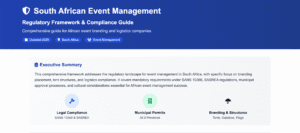The landscape of event planning in South Africa brims with opportunities for those looking to orchestrate memorable gatherings. Embarking on the journey to create an event demands a blend of creativity, meticulous organization, and a deep understanding of event dynamics. Crafting an affair that captivates and satisfies both client and attendee expectations is an art, where each flourish of event coordination influences the masterpiece of the final occasion. With the proper guidance, tools, and strategies, the realm of event management opens a path for aspiring planners to make a significant mark on the South African event scene.
Key Takeaways
- Begin with a robust business plan to anchor your event planning venture in South Africa.
- Invest in targeted marketing strategies to establish and grow your presence in the event industry.
- Identify and develop a clear and concise pitch that communicates the unique value of your services.
- Familiarize yourself with business structures and tax implications through reliable legal resources.
- Network with industry professionals and embrace mentorship for continued learning and growth.
- A successful event planning business relies on the combination of innovation and strategic budgeting.
Pre-Event Planning and Budgeting Strategies
The bedrock of any successful event planning business is a dynamic and robust business plan coupled with a strategic marketing approach. Event organization goes beyond the mere coordination of dates and venues; it involves a meticulous process of budgeting, promotion, and adaptation to meet the intricate needs of planned events. Incorporating essential components like event logistics and event production into the business strategy ensures that every aspect of an event is seamlessly managed. Let’s delve into how to develop a business plan that can withstand the turbulent waters of the event industry and cement your position as a market leader.
Developing a Professional Business Plan
An effective business plan serves as a navigational chart for your event planning business. It outlines your vision, establishes targets, and provides a clear path towards sustainability and expansion. Market research solidifies your strategy, reinforcing your understanding of client demands and optimizing your event services to satisfy those needs. Essential elements such as establishing a brand, conducting SWOT analysis, and planning for financial stability, are all embedded within your plan.
Understanding Marketing Costs and Promotional Tactics
Investing in event marketing is a decisive move towards carving out space for your brand within the industry. Critical investments in digital marketing, event promotion, and networking lay down the groundwork for client engagement. From crafting engaging social media campaigns to leveraging email marketing for event promotion, understanding where to allocate your budget can significantly enhance your promotional reach.
Defining Your Event Planning Services
Delineating the scope of your event services is crucial for cultivating the right clientele and maintaining a focused business direction. In defining the types of events you manage, asset reallocation can be optimized to ensure that each project delivers maximum return on investment. This clear definition not only makes your value proposition stronger but also streamlines your operational processes.
Below is a comparison of essential budget categories for any event planning start-up to consider:
| Category | Initial Budget | Long-Term Strategy |
|---|---|---|
| Business Planning and Legal | High Priority – Incorporation and licenses | Ongoing – Legal consultation and contingency funds |
| Marketing and Promotion | Significant – Branding, website, and campaigns | Reduced over time – Focus on analytics and ROI |
| Event Logistics and Production | Variable – Based on event scale | Sustainable – Vendor partnerships and efficiency |
| Staffing and Operations | Essential start-up hires | Growth-dependent – Team expansion and training |
By meticulously planning your business structure, understanding your marketing expenditures, and refining your service offerings, you’re setting your event planning enterprise on the path towards long-term success in the competitive market of South Africa.
Discovering Your Unique Value in the Event Market

Seizing success in event planning hinges on differentiating oneself in the bustling event market. Crafting and communicating a unique value proposition is a cornerstone for establishing a memorable brand identity amid competitors. This strategy should be deeply rooted in market knowledge and comparative strengths that make an event planning service stand out.
- Competitive Analysis: By surveying the existing event landscape, gauging competitor offerings, and identifying market gaps, one can pinpoint areas for innovation and specialization.
- Industry Trends: Staying ahead of emerging trends in event types, themes, and customer preferences can provide a crucial advantage, allowing event planners to offer modern and sought-after services.
- Client Experience: Enhancing client interaction throughout the event planning process can lead to increased satisfaction and loyalty, a metric which often translates to valuable referrals.
- Legal Acumen: Understanding and naviging the legal framework specific to the event planning industry in South Africa lends credibility and ensures a professional operation.
Each of these components helps to define a business’s unique strengths. Below is an overview of key aspects to consider when formulating a unique value proposition for an event planning business:
| Aspect | Details | Benefits |
|---|---|---|
| Pricing Structure | Adjusting pricing to market demands while ensuring profitability. | Attracts diverse clientele and promotes competitive edge. |
| Creativity and Innovation | Developing fresh, unique concepts for events that resonate with target audiences. | Positions your brand as a thought leader and an innovator. |
| Execution Excellence | Maintaining a high standard of service delivery from planning to execution. | Builds trust and dependability, encouraging repeat business. |
| Continual Improvement | Regularly updating skills and knowledge through industry resources and networking. | Keeps the business ahead of the curve and responsive to change. |
By emphasizing these differentiators, an event planner can confidently articulate their unique value proposition, enriching their standing and spurring growth in the dynamic field of event planning.
How can I create an event?
Entering the world of event planning presents a mosaic of opportunities and challenges, and one of the first steps is navigating the often complex backdrop of legal considerations for events. When starting an event planning business, you begin a journey that demands a critical understanding of administrative and legal intricacies that are paramount for your business’s compliance and success.
Legal and Administrative Considerations for Your Event Business
The foundation of administrative event planning is laid with the selection of a suitable business structure. An LLC might be favorable due to liability and tax considerations but understanding the specifics relevant to South Africa is key. Consulting with a legal advisor could ensure you meet all legal considerations for events, from contracts to licenses.
Utilizing Resources and Tools for Event Planning
To keep your event’s progression cohesive and systematic, event tools and event management software are vital. These technologies help in crafting user-friendly registrations, seamless attendee management, and precise event timing – all of which enhance the attendees’ experience while reinforcing professional event coordination.
Here’s a list of essential event planning resources that can empower your business:
- IRS and SBA guides for small business tax and administrative rules
- User-friendly event management software like Eventbrite or Cvent
- Project management tools such as Asana or Trello
Network Building with Event Industry Professionals
The event industry network can be a goldmine for shared knowledge and opportunities. Joining organizations, both locally and internationally, provides not just event industry mentoring but also the chance to connect with peers, share experiences, and even forge potential partnerships.
A strong network can open up avenues for collaboration, which is a substantive aspect of professional event coordination. Here’s how you might structure your networking efforts:
| Networking Method | Benefits |
|---|---|
| Social Media Engagement | Expand reach, connect with global professionals |
| Industry Seminars and Webinars | Learn from experts, stay updated with trends |
| Membership in Professional Bodies | Access to exclusive resources, mentorship programs |
| Collaborative Events | Joint branding, resource sharing |
Conclusion
The roadmap to event planning success in South Africa is paved with intricacies and opportunities. At the heart of launching an event lies not only the vision but the operative event strategy that brings it to life. Through careful and consistent application of strategic budgeting, event planners can control resources efficiently and ensure their projects align with client expectations, reinforcing a cycle of trust and professional integrity.
Understanding your niche and presenting a unique value proposition are fundamental in differentiating your services in the vibrant landscape of South Africa events. When paired with legal and administrative awareness, these elements build a sturdy operational base from which your event planning venture can thrive. Moreover, the progressive integration of innovative planning resources and tools affords increased agility and effectiveness, effectively managing the myriad of logistical details that come with event management.
Engagement with a network of peers and seasoned industry figures opens up avenues for mentorship and professional development. By nurturing these connections, aspirants and established planners alike can share knowledge, uncover industry trends, and champion best practices. In conclusion, persistent progression through these structured stages heralds the promise of a flourishing career in event planning, with the reward of success reflected in every successful gathering orchestrated.
FAQ
What are the first steps to creating an event in South Africa?
Begin with conducting thorough market research, develop a detailed business plan, and decide on the specific event planning services you want to offer. Understand your unique value proposition and ensure you have a clear pitch for your business.
How do I develop a professional business plan for my event planning business?
Research successful business models and utilize online templates and resources to create a business plan. This should include your business structure, market analysis, services offered, marketing strategies, and financial projections.
What should I consider when budgeting for event marketing and promotion?
Allocate a significant portion of your budget to marketing activities such as creating a business website, designing business cards and flyers, and investing in digital marketing strategies. Understand that the initial investment is crucial to building a client base that will grow through referrals over time.
How do I define my event planning services?
List the types of events you are equipped to manage and define the scope of services you provide. Be specific about your capabilities to align with customer needs and avoid overextending your resources.
How can I identify my unique value proposition in the event market?
Analyze your competitors and determine what sets you apart, whether it’s your pricing, creativity, execution, or a specific niche you serve. Market this unique selling point to your target audience.
What are the key legal and administrative considerations for starting an event business?
Choose the right business structure, such as an LLC, and understand the tax implications for your business. Ensure you have all necessary permits, licenses, and insurance in place. It might be advisable to consult with a legal professional.
What resources and tools are helpful for event planning?
Utilize event management software for various planning aspects such as seating arrangements and meal planning. Explore resources provided by the IRS, SBA, and specific event planning platforms for added support and industry insight.
How can I effectively build a network within the event industry?
Engage on social media platforms, join networking groups, attend industry events, and consider joining organizations like Women In Events to find mentorship and collaborate with industry professionals.
What role does event industry mentoring play in starting an event planning business?
Mentoring provides guidance, insights into industry best practices, and helps you to avoid common pitfalls. It can also lead to professional growth and opportunities for collaboration through a more robust industry network.




